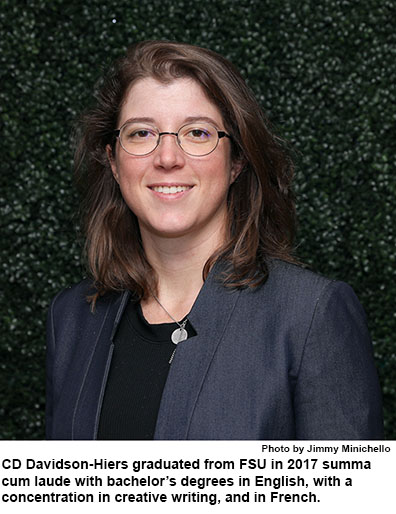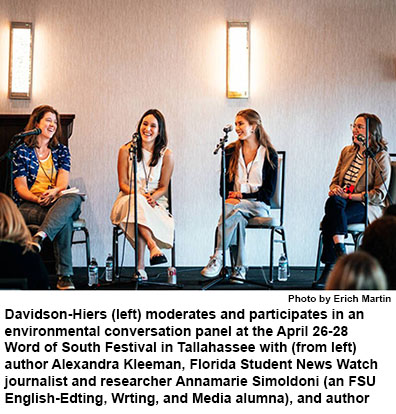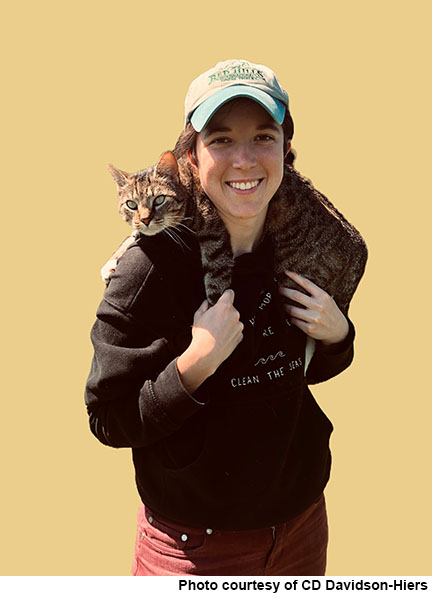Alumna CD Davidson-Hiers finds contentment in the outdoors, while she navigates a return to journalism, the craft of writing
By Des Lewis
Catherine Deborah Davidson-Hiers, known more commonly as CD, is a Florida State University English alumna who has built an extensive journalism career since her time at FSU.
Some of her more recent professional undertakings set Davidson-Hiers in her most cherished place: the outdoors. Her passion for the environment has been with Davidson-Hiers since her childhood. She grew up in Florida’s Panhandle on a 40-acre horse farm, with half the property wild and undeveloped.
 She fondly remembers exploring the biodiversity of that environment.
She fondly remembers exploring the biodiversity of that environment.
“I'd go out by myself and explore the woods, and there's a swamp and a pond and fields,” Davidson-Hier says. “It's full of many different micro-ecosystems that change pretty quickly. I spent a lot of time in those woods and in the swamp.”
In addition to sparking a lifelong appreciation for the environment, those experiences in nature in turn awakened her love of writing.
“I spent a lot of time with my imagination and learning things that were hard to put to words until I started getting to college,” she says. “I think that's exactly why I'm turning into a writer, being able to give voice to the things that I observed as a kid like bird songs, knowing what certain calls meant when I was listening, or if the birds went quiet, that meant something was near, or like what snakes were venomous and what wasn't.”
Davidson-Hiers graduated in 2017 summa cum laude with bachelor’s degrees in English, with a concentration in creative writing, and in French. Since her graduation, she has held staff writer positions with the Tallahassee Democrat and USA TODAY Network. In addition, her freelance journalism work has appeared in publications such as the Bitter Southerner, Flamingo Magazine, and The Nation, among others.
“CD’s success is a result of her wide-ranging intellect, her curiosity, and her skilled prose,” English Professor Diane Roberts says. “Whether it’s a story about a gay polo match, hurricanes and climate change, or Florida’s attack on students, it’s well reported and vividly written.”
Davidson-Hiers currently is a program and membership specialist for the Education Writers Association, a nonprofit journalism organization. EWA’s mission, according to its website, “is to strengthen the community of education writers and improve the quality of education coverage to better inform the public.”
She also is director of Florida Student News Watch, which she founded in 2020. She works with and develops young writers to become more environmentally conscious as journalists and researchers.
 A specific example Davidson-Hiers recounts from her own childhood that encouraged her interest in the environment is a run-in she had with a water moccasin at the age of 6. Instead of finding fear through this experience, however, she found beauty in the unspoken bond humanity has with nature.
A specific example Davidson-Hiers recounts from her own childhood that encouraged her interest in the environment is a run-in she had with a water moccasin at the age of 6. Instead of finding fear through this experience, however, she found beauty in the unspoken bond humanity has with nature.
“Just having to freeze and orient yourself around this creature that you have no common language with but can still communicate with in a sort of visceral way—it matters a lot to me that these places and creatures can be preserved because it also ultimately affects human health,” she says. “We are not immune from the ravaging of our natural spaces.”
Davidson-Hiers’ childhood dream, and to this day, is to be a published fantasy author, and she currently has a project in the works. She enjoys the fantasy worlds of other people, and she often re-wrote other famous stories as a child and made them her own.
Her time growing up on a horse farm, which included competing for several years in equestrian-related sports, is what landed Davidson-Hiers her first journalism job. She tells the story of reaching out to the Tallahassee Democrat to ask if she could report on the Red Hills Horse Trials, an annual local equestrian event that ended in 2022 after 25 years.
“I emailed the newspaper, saying ‘I grew up riding horses and go to this event every year, and let me write about it.’” she recalls, thinking the worst that could happen is the editors do not like what she wrote, and the paper does not publish the article. “My stories wound up on the front page of the sports section. Seeing my work in print, paired with the fact that I grew up around horses and that's what I was writing about, really lit the fire of a reality that I take what I know, I write about it, and I get paid. Oh my gosh, I could do something with this.”
After working with the newspaper for that article, Davidson-Hiers soon became the Democrat’s Education and Families reporter. Although journalism was not her desired career path throughout her undergraduate experience, she believes her creative writing background has made her a better journalist.
“The word that I think best captures what I could bring with me was ‘empathy,’ and I'm grateful for that,” she says. “Being able to relate to the people that you're writing about and to understand to an extent the risk for them in speaking to you, or what the stakes are involved in the story that you're doing, helps give you a perspective that I don't think I would have had without a creative writing background.”
Her strength in empathy took a toll on her relationship with writing and mental health during the COVID-19 pandemic, when Davidson-Hiers became the newspaper’s leading contact for news and updates about the virus. The newfound reliance that was put on her quickly became overwhelming.
“There was nothing you could do to save the people that you were writing about dying,” she says. “People would be text me from the COVID intensive care unit at the hospital and then, I wouldn't hear from them again. It was traumatizing.”
Furthermore, the amount of work and writing she produced gave her little time to react to her own stresses and concerns surrounding the pandemic.
“What COVID did was universalized suffering, and it was scary to be writing about something that could kill you, too,” Davidson-Hiers says.
Her reporting opened a line of communication for people confused by Florida’s registration process for the virus’ vaccine, which put Davidson-Hiers in an unintended role as liaison to help address the bureaucracy. Early in January 2021, The Washington Post published a profile of Davidson-Hiers headlined “A local reporter in Florida has become seniors’ unofficial vaccine hotline.”
Navigating the pressures of coping with the pandemic herself and being a resource for others became too much of a burden, ultimately resulting in Davidson-Hiers briefly stepping away from journalism. Ironically enough, writing is what cured her broken relationship with journalism.
“During the pandemic, I burnt out, and it was a very dangerous situation,” she says. “Since then, in rebuilding my mind, I have learned the different rooms each discipline is stored in, in my head. So, when I have reached a certain level in one room, I need to go into the other one, metaphorically.
“With journalism, you're writing about things that are outside of your control, and that can feel incredibly destabilizing and dispiriting or disheartening, pick your word.”
On April 26, 2023, Poynter.org published Davision-Hiers’ essay “Covering the COVID-19 pandemic, I burnt out. Recovery brings me back.” This “recovery writing” for her ranges from fantasy story writing to non-fiction essays. Though difficult at first, these activities helped her get through the mental issues she faced in the wake of COVID-19.
“After COVID, I felt like my mind broke, but the only thing I could do was write creatively,” she says. “So, I kept doing that and I have been actively trying to rebuild my relationship with journalism.”
In addition to her faculty position at FSU, Roberts is a highly regarded journalist as well. Along with others who know Davidson-Hiers, she witnessed her commitment not only to the stories was writing but also to the people she met while writing them.
“She is a dogged reporter who believes in public service journalism,” Roberts says. “During Covid, she not only produced stories on the pandemic, but she also became a resource for frightened and confused readers who would contact her for information on tests and vaccines. She returned every call, revealing a generosity and dedication which got her noticed in the national media.”
While reflecting on the experience, Davidson-Hiers found the importance of her mental health not only as an individual but as a journalist as well.
“I think that more journalists need to realize or engage with their own mental health, our own mental health in that what we write about affects us directly, whether we are involved in the situation or not,” she says. “And that's okay and that's normal. And knowing yourself makes you a better journalist.”
With her renewed energy and focus, Davidson-Hiers can now explore the outdoor worlds she knows best.
Destany Lewis is a junior who is majoring in English-Editing, Writing, and Media.
Follow the English department on Instagram @fsuenglish; on Facebook facebook.com/fsuenglishdepartment/; and Twitter, @fsu_englishdept
